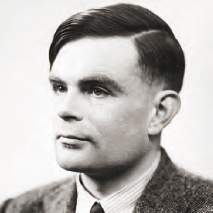Analytic PhilosophyJerry Fodor |
Who was Alan Mathison Turing? |
Alan Mathison Turing (1912–1954) was a British cryptologist and mathematician who is credited with founding modern computer science. His Turing Machine, which was an extensive thought experiment, formalized the concepts of algorithms and computation. The Turing Machine consists of a possibly infinite paper tape with a stream of binary symbols that is continually scanned by a “read-write” device moving left or right and erasing or writing symbols on the tape, according to a program.
Turing showed that any such machine could be programmed to simulate any other one, meaning that it was a “universal machine.” This universal machine could implement every known mathematical method. He extended this model to machines that cannot be simulated by a universal Turing machine, called Oracle machines. Turing proposed that intellectual activity can be understood as networks of universal and non-universal machines that can learn, through “training,” to become something like universal machines.
After the invention of actual electronic computers, Turing suggested that theories of “artificial intelligence” could be tested. If there were a computer that could perform the same calculations as a human being—to the point where a human being could not tell whether the results were produced by the computer or by another human being—then there could theoretically exist artificial intelligence. Turing’s 1950 article in Mind, “Can Machines Think?,” continues to be highly influential in philosophy of mind discussions, in part as a result of John Searle’s (1932-) treatment of it.

